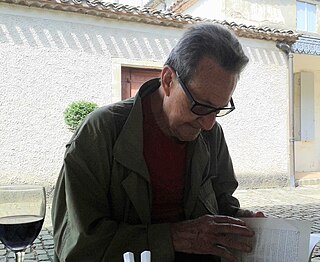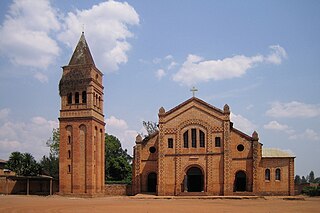
Burundi originated in the 16th century as a small kingdom in the African Great Lakes region. After European contact, it was united with the Kingdom of Rwanda, becoming the colony of Ruanda-Urundi - first colonised by Germany and then by Belgium. The colony gained independence in 1962, and split once again into Rwanda and Burundi. It is one of the few countries in Africa to be a direct territorial continuation of a pre-colonial era African state.
Human occupation of Rwanda is thought to have begun shortly after the last ice age. By the 11th century, the inhabitants had organized into a number of kingdoms. In the 19th century, Mwami (king) Rwabugiri of the Kingdom of Rwanda conducted a decades-long process of military conquest and administrative consolidation that resulted in the kingdom coming to control most of what is now Rwanda. The colonial powers, Germany and Belgium, allied with the Rwandan court.
The Hutu, also known as the Abahutu, are a Bantu ethnic or social group which is native to the African Great Lakes region. They mainly live in Rwanda, Burundi and the eastern Democratic Republic of the Congo, where they form one of the principal ethnic groups alongside the Tutsi and the Great Lakes Twa.
The Tutsi, also called Watusi, Watutsi or Abatutsi, are an ethnic group of the African Great Lakes region. They are a Bantu-speaking ethnic group and the second largest of three main ethnic groups in Rwanda and Burundi.

Paul Kagame is a Rwandan politician and former military officer who has been the fourth President of Rwanda since 2000. He was previously a commander of the Rwandan Patriotic Front (RPF), a rebel armed force which invaded Rwanda in 1990. The RPF was one of the parties of the conflict during the Rwandan Civil War and the armed force which ended the Rwandan genocide. He was considered Rwanda's de facto leader when he was Vice President and Minister of Defence under President Pasteur Bizimungu from 1994 to 2000 after which the vice-presidential post was abolished.

The Rwandan Patriotic Front, is the ruling political party in Rwanda.

The Rwandan genocide, also known as the genocide against the Tutsi, occurred between 7 April and 15 July 1994 during the Rwandan Civil War. During this period of around 100 days, members of the Tutsi minority ethnic group, as well as some moderate Hutu and Twa, were killed by armed Hutu militias. Although the Constitution of Rwanda states that more than 1 million people perished in the genocide, the actual number of fatalities is unclear, and some estimates suggest that the real number killed was likely lower. The most widely accepted scholarly estimates are around 500,000 to 800,000 Tutsi deaths.
Banyamulenge is a community from the Democratic Republic of the Congo's South Kivu province. The Banyamulenge are culturally and socially distinct from the Tutsi of North Kivu, with most speaking Kinyamulenge, a mix of Kinyarwanda, Kirundi, Ha language, and Swahili. Banyamulenge are often discriminated against in the DRC due to their Tutsi phenotype, similar to that of people living in the Horn of Africa, their insubordination towards colonial rule, their role in Mobutu's war against and victory over the Simba Rebellion, which was supported by the majority of other tribes in South Kivu, their role during the First Congo War and subsequent regional conflicts (Rally for Congolese Democracy–Goma, Movement for the Liberation of the Congo, National Congress for the Defence of the People, and more importantly for the fact that two of the most influential presidents of their country declared them as enemy of the State both in 1996 and 1998.

The First Congo War (1996–1997), also nicknamed Africa's First World War, was a civil war and international military conflict which took place mostly in Zaire, with major spillovers into Sudan and Uganda. The conflict culminated in a foreign invasion that replaced Zairean president Mobutu Sese Seko with the rebel leader Laurent-Désiré Kabila. Kabila's unstable government subsequently came into conflict with his allies, setting the stage for the Second Congo War in 1998–2003.
Political repression is the act of a state entity controlling a citizenry by force for political reasons, particularly for the purpose of restricting or preventing the citizenry's ability to take part in the political life of a society, thereby reducing their standing among their fellow citizens. Repression tactics target the citizenry who are most likely to challenge the political ideology of the state in order for the government to remain in control. In autocracies, the use of political repression is to prevent anti-regime support and mobilization. It is often manifested through policies such as human rights violations, surveillance abuse, police brutality, imprisonment, involuntary settlement, stripping of citizen's rights, lustration, and violent action or terror such as the murder, summary executions, torture, forced disappearance, and other extrajudicial punishment of political activists, dissidents, or general population. Direct repression tactics are those targeting specific actors who become aware of the harm done to them while covert tactics rely on the threat of citizenry being caught. The effectiveness of the tactics differ: covert repression tactics cause dissidents to use less detectable opposition tactics while direct repression allows citizenry to witness and react to the repression. Political repression can also be reinforced by means outside of written policy, such as by public and private media ownership and by self-censorship within the public.

This is a bibliography for primary sources, books and articles on the personal and general accounts, and the accountabilities, of the 1994 Rwandan genocide.

René Lemarchand is a French-American political scientist who is known for his research on ethnic conflict and genocide in Rwanda, Burundi and Darfur. Publishing in both English and French, he is particularly known for his work on the concept of clientelism. He is a Professor Emeritus at the University of Florida, and continues to write, teach internationally and consult. Since retiring he has worked for USAID out of Abidjan, Côte d'Ivoire as a Regional Consultant for West Africa in Governance and Democracy, and as Democracy and Governance advisor to USAID / Ghana.

Racism in Africa has been a recurring part of the history of Africa.

Christianity is the largest religion in Rwanda. The most recent national census from 2012 indicates that: 43.7% of Rwanda's population is Catholic, 37.7% is Protestant, 11.8% is Seventh-day Adventist, 2.0% is Muslim, 2.5% claims no religious affiliation, and 0.7% is Jehovah's Witness.

Burundi, officially the Republic of Burundi, is a landlocked country in the Great Rift Valley at the junction between the African Great Lakes region and East Africa. It is bordered by Rwanda to the north, Tanzania to the east and southeast, and the Democratic Republic of the Congo to the west; Lake Tanganyika lies along its southwestern border. The capital cities are Gitega and Bujumbura, the latter being the country's largest city.

The largest ethnic groups in Rwanda are the Hutus, which make up about 85% of Rwanda's population; the Tutsis, which are 14%; and the Twa, which are around 1%. Starting with the Tutsi feudal monarchy rule of the 10th century, the Hutus were a subjugated social group. Belgian colonization also contributed to the tensions between the Hutus and Tutsis. The Belgians and later the Hutus propagated the myth that Hutus were the superior ethnicity. The resulting tensions would eventually foster the slaughtering of Tutsis in the Rwandan genocide. Since then, policy has changed to recognize one main ethnicity: "Rwandan".
Rwandan genocide denial is the pseudohistorical assertion that the Rwandan genocide did not occur, specifically rejection of the scholarly consensus that Rwandan Tutsis were the victims of genocide between 7 April and 15 July 1994. The perpetrators, a small minority of other Hutu, and a fringe of Western writers dispute that reality.
Timothy Paul Longman is a professor of political science and international relations at Boston University. A protege of Alison Des Forges, he is recognized as one of the top authorities on the Rwandan genocide and its legacies.

The Ikiza, or the Ubwicanyi (Killings), was a series of mass killings—often characterised as a genocide—which were committed in Burundi in 1972 by the Tutsi-dominated army and government, primarily against educated and elite Hutus who lived in the country. Conservative estimates place the death toll of the event between 100,000 and 150,000 killed, while some estimates of the death toll go as high as 300,000.
The double genocide theory posits that, during the Rwandan genocide, the Tutsi-led Rwandan Patriotic Front (RPF) engaged in a "counter-genocide" against the Hutus. Most scholars of Rwanda, such as Scott Straus and Gerald Caplan, say that RPF violence against Hutus does not fully match the definition of "genocide", considering that it instead consisted of war crimes or crimes against humanity.









